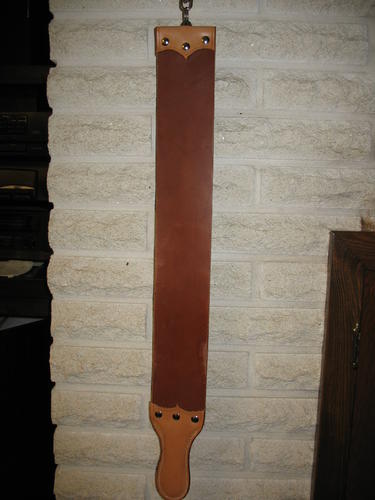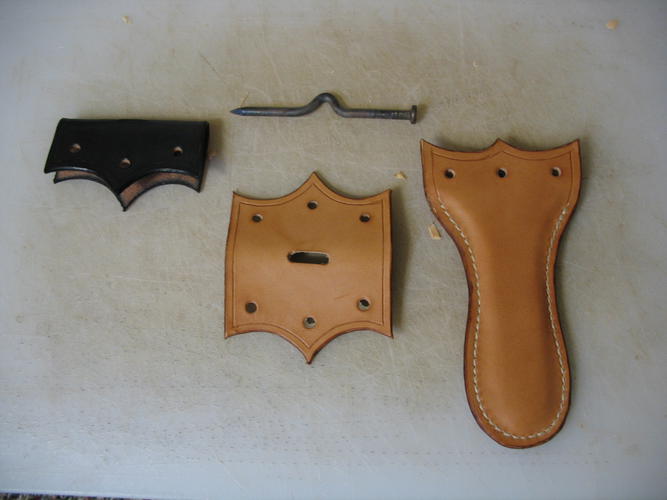Results 1 to 10 of 45
Thread: How to Make a Good Strop?
-
09-13-2014, 08:13 PM #1Member

- Join Date
- Sep 2014
- Location
- Chicago IL, USA
- Posts
- 55
Thanked: 4 How to Make a Good Strop?
How to Make a Good Strop?
Alright, yes, this question is everywhere. However, it's fragmented and usually suffers from variable and opinionated replies, so in my own interests and for the benefit of future DIYers, I would like to ask a more complete and comprehensive question to find more complete answers.
Obviously the dimensions and type of the strop depend on the blade, but what of the materials used to create the strop? I see three primary materials: leather, polishing compound, and backing (optional?).
What kind of leather is appropriate for a quality strop? Tooling (veg tanned)? Full grain or top grain?
What weight of leather? 3oz, 5oz, 11oz?! Should the flesh side by sanded for consistency?
Will tooling the leather ruin the strop? Obviously embossing will, but what of stamping and other decorative modifications?
Should the leather be conditioned? Neatsfoot oil? To what extent?
What kind if polishing compound(s) ought to be used? None? Jeweler's rouge? Two grades, one on either side?
Should the compound be periodically reapplied or well infused to start and left alone?
Is a backing necessary? Linen? Do you use different compounds on it?
An answer to any of these questions is greatly appreciated. Keep in mind that the intention is to make a working strop, not a piece of perfection. I am aiming for a B- in quality, not an A+, so please avoid opinions against less than perfect materials.
For the price of a commercially sold strop and half a day of my time, I can make a working strop and have quality leather, polishing compound, and other materials left over for future projects. Clearly that's the best option in my opinion.
-
09-13-2014, 09:18 PM #2

to say that there is only one way would be wrong. here is how i made mine. found some 6-7oz. leather 3 inch wide and around 24 inches long. i'm not sure exactly what kind it is but it just needs to be smooth on one side. The reason i say it doesn't matter what kind is that you can buy strops made from latigo, veg tanned, bridle, and from all different kinds of animals as well. they all give a different feel (or draw). generally a strop that you use for every day doesn't need any compound, just rub briskly with the palm of your hand before use and your skin oil will be enough. For a secondary strop i glued some denim to some strips of cardboard (not the corrugated kind).here's some images.


i chose to put a handle on it because it is easier to hold on to for me. the hanger end i made from a bent 20d nail. it is all held together with chicago screws if i need to replace the leather.
-
The Following 2 Users Say Thank You to tintin For This Useful Post:
Blistersteel (09-16-2014), Smythe302 (11-18-2014)
-
09-13-2014, 09:55 PM #3Member

- Join Date
- Sep 2014
- Location
- Chicago IL, USA
- Posts
- 55
Thanked: 4
The denim/cardboard idea is genius. I use cardboard for stopping my knives, so gluing denim to the gloss side would make for a double sided strop. Now to determine the grit equivalent of cardboard.
Do you use compound with the denim?
Also, the type of leather can make a big difference in its surface hardness. The grain on full grain leather, especially when compressed, is very firm. Although the leather is flexible, it takes significant force to press into the surface. This is not dependent on the thickness of the leather, so even lower weights can provide a firm unforgiving surface to avoid rounding an edge. Other leathers with the grain altered or removed often don't provide the same qualities.
I know all of this about leather, but I don't know how it applies to strops for fine razors. Do you think that a firm leather like full grain tooling leather could achieve greater results and/or lower the risk if rounding the edge? Perhaps the potential of such leather is beyond the scope of necessity?
-
09-13-2014, 10:55 PM #4

now you are getting a little too technical for me
 . it seems that most of the strops i have seen use the grain side and not the flesh side. As for using compound i have a vintage linen strop that i have put some chromium oxide for touching up the razor when it starts to dull.i'm sure it would work as well on denim.
. it seems that most of the strops i have seen use the grain side and not the flesh side. As for using compound i have a vintage linen strop that i have put some chromium oxide for touching up the razor when it starts to dull.i'm sure it would work as well on denim.
-
09-13-2014, 11:08 PM #5Member

- Join Date
- Sep 2014
- Location
- Chicago IL, USA
- Posts
- 55
Thanked: 4
I once read that you can use compound on the flesh side (MUST be veg tanned, flesh side is too soft on other types). You then use the grain side bare.
I use the flesh side of 9oz tooling leather for my chisels, and those get dangerously sharp; probably as sharp as a straight razor considering the ease with which they remove hairs from my arm.
The chisels make good example of tooling leather's firmness because they require a complete flat and consistent angle from shoulder to point. To achieve that with the soft side of the leather speaks volumes about the leather's firmness.
-
The Following User Says Thank You to Sirnanigans For This Useful Post:
tintin (09-14-2014)
-
09-14-2014, 02:17 AM #6

Please make a video of shaving your face with the chisel, that way we can see if it's that sharp, save me some money I got some nice chiseled already. As far as the strop goes as long as it's smooth it will work. , some of the roo strops are pretty thin and they work well also.
“ I,m getting the impression that everyone thinks I have TIME to fix their bikes”
-
09-14-2014, 02:50 AM #7

Welcome aboard,,, first I'd like to thank you for your direct, let's get to the point, first post. You managed to asked "8" questions in a single, condescending post. Nothing like walking past the front desk & heading straight for the continental breakfast; would you like a To-Go box with that?

Most, if not all of your questions, can be answered by reading threads posted in our stropping section & using our "Advanced" search button, above right, top of the page. Be cautious though, there are a lot of "opinionated replies" from members who make a living from producing strops & working with leather of all types,,, some of these members are literally, world famous for their craftsmanship. ,,,, and that's not just my opinion
Your post asks for a lot of specific information that members here are more than willing to give you, that's the way we are.
Then, as goodwill starts to fall upon you, with the responses of your fellow members, ,,,,you slam the door in their face with your last 2 paragraphs:
"An answer to any of these questions is greatly appreciated. Keep in mind that the intention is to make a working strop, not a piece of perfection. I am aiming for a B- in quality, not an A+, so please avoid opinions against less than perfect materials.
For the price of a commercially sold strop and half a day of my time, I can make a working strop and have quality leather, polishing compound, and other materials left over for future projects. Clearly that's the best option in my opinion. "
-
09-14-2014, 03:38 AM #8

You can buy a piece of leather on Ebay for 12 bucks an SRD linen replacement for 4..... glue them or hang them. I somewhat agree with Hirlau on this; what are you asking? How do I make a sloppy strop? A star shaving strop is pretty cheap so I am guessing you are talking about higher end strops price wise? What is you goal?
Razor rich, but money poor. I should have diversified into Eschers!
-
09-14-2014, 03:55 AM #9
-
09-14-2014, 04:17 AM #10

As tc said, roo is very thin, and makes a nice strop. It's something to do with the way the fibres in the leather lay I think, if I recall neil miller posted something about it. I have a roo and a thicker unknown leather strop, they are both different but work. As long as the surface is smooth it will work from what I understand. Much as my roo strop has small nicks in it which I would imagine would be as detrimental as stamping I.e. not very in my opinion, i wouldn't deliberately stamp the stropping area.
The width and length of the leather really has no relationship to the size of the blade, typically razor strops are 2-3" wide but i have heard of people using narrower material and I am sure that I have seen a video of someone using a strop that looks to be about 6" wide. I use a length of around 18" of stropping surface whereas obie uses 6-7".Bread and water can so easily become tea and toast


 25Likes
25Likes LinkBack URL
LinkBack URL About LinkBacks
About LinkBacks






 Reply With Quote
Reply With Quote








